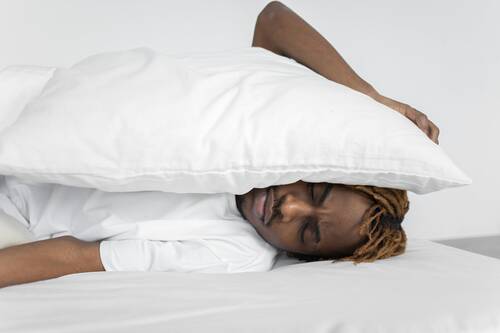 Stress can negatively affect your sleep and contribute to feelings of anxiety. By understanding how sleep and stress are connected, you can take steps to manage your stress and improve your overall health. This article gives you some tips to get there.
Stress can negatively affect your sleep and contribute to feelings of anxiety. By understanding how sleep and stress are connected, you can take steps to manage your stress and improve your overall health. This article gives you some tips to get there.
When stress keeps you on high alert, it can hinder your ability to fall asleep, leading to fragmented and unrefreshing rest. Recognizing this relationship provides an opportunity to break the cycle. By addressing stress effectively, you can enhance the quality of your sleep and promote a more restful and restorative night.
Understanding the Stress-Sleep Link
Constant stress can disturb the body's natural sleep-wake cycle and prevent sleep or sleep initiation. An underlying physiological response to stress, for example, increased heart rate and alertness, may prevent deep sleep necessary for recovery. It may eventually lead to chronic sleep deprivation and increased stress.
The racing thoughts and anxiety associated with stress can keep the mind active and prevent relaxation. Stress can also create physical symptoms like muscle tension and headaches that interrupt sleep. By identifying these sleep disturbances caused by stress, people can begin to manage stress and improve their sleep. This may involve lifestyle changes, relaxation and a sleep-friendly environment.
The connection between stress and sleep goes both ways. If you don't get good sleep, it can ramp up your stress levels, creating a tough cycle to escape. A night of tossing and turning, for instance, can leave you feeling cranky and unready to tackle the day, which only adds to your stress.
Both sides of this relationship, stress reduction and sleep improvement, can help you get back in balance. Smaller, consistent efforts like learning relaxation techniques or changing your sleeping environment can add up over time. With proactive steps, you can break this cycle towards better sleep and lower stress.
(more…)
 Stress can negatively affect your sleep and contribute to feelings of anxiety. By understanding how sleep and stress are connected, you can take steps to manage your stress and improve your overall health. This article gives you some tips to get there.
When stress keeps you on high alert, it can hinder your ability to fall asleep, leading to fragmented and unrefreshing rest. Recognizing this relationship provides an opportunity to break the cycle. By addressing stress effectively, you can enhance the quality of your sleep and promote a more restful and restorative night.
Stress can negatively affect your sleep and contribute to feelings of anxiety. By understanding how sleep and stress are connected, you can take steps to manage your stress and improve your overall health. This article gives you some tips to get there.
When stress keeps you on high alert, it can hinder your ability to fall asleep, leading to fragmented and unrefreshing rest. Recognizing this relationship provides an opportunity to break the cycle. By addressing stress effectively, you can enhance the quality of your sleep and promote a more restful and restorative night.
 Stress can negatively affect your sleep and contribute to feelings of anxiety. By understanding how sleep and stress are connected, you can take steps to manage your stress and improve your overall health. This article gives you some tips to get there.
When stress keeps you on high alert, it can hinder your ability to fall asleep, leading to fragmented and unrefreshing rest. Recognizing this relationship provides an opportunity to break the cycle. By addressing stress effectively, you can enhance the quality of your sleep and promote a more restful and restorative night.
Stress can negatively affect your sleep and contribute to feelings of anxiety. By understanding how sleep and stress are connected, you can take steps to manage your stress and improve your overall health. This article gives you some tips to get there.
When stress keeps you on high alert, it can hinder your ability to fall asleep, leading to fragmented and unrefreshing rest. Recognizing this relationship provides an opportunity to break the cycle. By addressing stress effectively, you can enhance the quality of your sleep and promote a more restful and restorative night.


